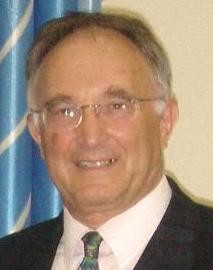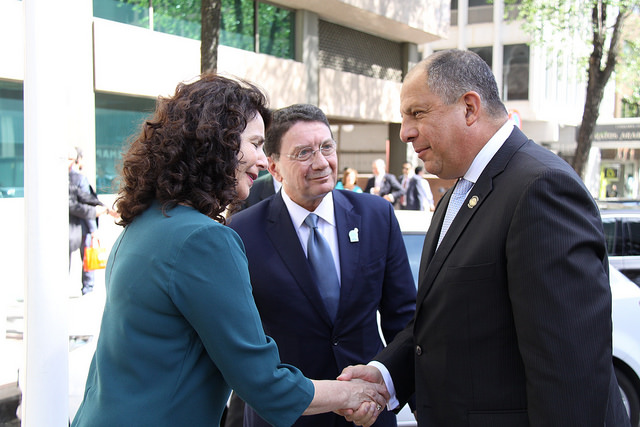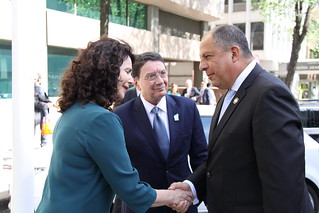

St. Ange gone – so then there were five and more questions
The UNWTO Secretary General election is only two days away. Candidates and Exeuctive Council members are gathering in Madrid at the Melia Castillo Hotel already and last minute lobbying is going on full speed.
So then there were 5 – More Questions than Answers for the UNWTO Executive Council when voting in the new Secretary General on Friday (Opinion delivered by Professor Geoffrey Lipman)
Alain St. Ange ran a valiant uphill campaign for Secretary General of UNWTO. It fell not on his ability or vision, but on the fact, that another candidate from Africa, Walter Mzembi has the support of the Members of the African Union – and that included Mr. St. Ange’s country of Seychelles.
In the end, it was the determining factor, and as the race got down to the wire it is no surprise that all the stops came out. It’s pity is that St. Ange’s vision on issues like climate, safety or small island needs, as well as his vitality, will be lost.
But one should not make the mistake of seeing Mr Mzembi simply as a political play. He is young but seasoned in a tough socio-political cauldron. He has done much to rekindle the spirit, visibility, and performance of Zimbabwe Tourism: as well as raising the profile and collaborative engagement of African nations through his longstanding chairmanship of the UNWTO Commission for Africa. His plans for UNWTO are well thought through, bold, visionary, and yet at the same time soundly grounded in the organization’s structural reality.
It is why he presents a very attractive candidacy. And no one can doubt that Africa with its massive emerging population and development challenges would get a massive boost.
He faces tough opponents
Marcio Favilla is a committed Tourism leader, having served his country as Deputy Minister of Tourism and then as an Executive Director at UNWTO. He is a good man who understands the opportunities and challenges facing the organization in increasingly uncertain times. He is an insider but with significant outside experience. His program reflects this. Like the two previous Secretary Generals, he has been in the leadership of the organization for many years. His plans are sound and his commitment is total. He is a very safe pair of hands.
The Dho/Vogeler ticket is something new for the organization – where two people have teamed up to complement their individual strength and challenges as candidates. It is an anomaly. In the case of Carlos Vogeler he simply was unable to get the essential support of his government to run for the top job, and he covers the same region as Marcio Favilla. And the lead candidate Ambassador Young Shim Dho didn’t have the international political support needed to mount a powerful campaign. Hence the idea of 2 for one. The program they advocate is as expected preserving the good elements of the existing regime with a solid future focus – highly organized, designed and professionally presented.
There are however, positive and negative issues in the concept of a ticket rather than an individual – moral and legal, the age, experience, compatibility, and balance of the candidates. Then there is the complex issue of the place of the flagship ST-EP program – now with a new Korean based International Organization to manage it.
But of course, here I must declare an interest, having conceived ST-EP, perhaps before its time, as a measurable, MDG delivery vehicle, in the spirit of today’s SDG’s …..
Finally, there are the relatively unknown candidates.
Ambassador Zurab Pololikashvili has run a formidable political leadership campaign using European solidarity and the proactive engagement of his Head of State to advance his candidature. His program of reform and stability is on the surface the kind of change the organization expects and needs. He targets the right internal / external realities as the other candidates. His “glocal” focus is an important recognition of increasing community influence on tourism’s future..
Ambassador Jaime Alberto Cabal the Colombian Ambassador to Austria, who identifies his President and country as a driving force behind his candidacy and Latin America as the base.. He rightly argues for a full UN state membership of UNWTO – from 150 to some 200 and especially the “free riding” Anglo-Saxon community. He majors also on increased collaboration with private sector and NGO interests through an extension and upgrade of the Affiliates. He presses the right industry buttons on security and sustainability, and it remains to be seen how deep his vision penetrates.
Aside from questions that have been raised on the levers that are being pulled by the campaigns, the real question is can someone with limited knowledge of the wide scale and scope of the UNWTO’s activities, as well as the global relationships, strengths, and weaknesses, really drive the change advocated in increasingly uncertain times.
And of course, for me, there iis the fundamental underlying question – which one of all the candidates, really recognizes that if Climate Change is eXistential how do we make the deep changes to respond to that stark reality. Because as Naomi Klein says “That Changes Everything”
So many questions. Happily, we will know the answers by the end of the week.
Professor Geoffrey Lipman
Co-founder SUNx,
President International Coalition of Tourism Partners (ICTP)

UNWTO names President of Costa Rica as Special Ambassador of the International Year of Sustainable Tourism for Development
As part of the observance of the International Year of Sustainable Tourism for Development, the World Tourism Organization (UNWTO), which is leading the campaign, has named Costa Rican President Luis Guillermo Solís Rivera as Special Ambassador of this important global action. The initiatives developed by Costa Rica in the field of sustainable tourism as well as its international positioning and momentum in this field are some of the factors behind the designation.
Traditionally considered an example of environmental commitment, Costa Rica is home to 5% of the world’s biodiversity. In addition, more than 25% of the country’s land area is classified as protected, and the country is already being powered 100% with renewable energy. One of the most outstanding initiatives carried out by Costa Rica has been the creation of the Certification for Tourism Sustainability. The programme, designed by the Costa Rican Tourism Institute, categorizes and differentiates tourism companies based on their environmental commitment.
“This recognition for Costa Rica bears witness to our emphasis on this non-smokestack industry. It also allows us to strengthen our drive to encourage more women to lead sustainable tourism projects for their economic empowerment,” said Luis Guillermo Solís Rivera, President of the Republic of Costa Rica.
“The International Year of Sustainable Tourism for Development is a unique opportunity to promote common action, but also to underline efforts in this field; and Costa Rica’s contribution to global sustainability is one of the best examples to follow. We are very grateful to President Solís for his support and leadership in advancing tourism as a tool for sustainable development,” explained UNWTO Secretary-General Taleb Rifai.
The International Year of Sustainable Tourism for Development marks an important milestone in the 2030 Agenda and in the progress towards the achievement of the Sustainable Development Goals, in which the tourism sector appears as a key tool. The figure of Special Ambassadors is aimed at providing a global focus to the International Year, as well as to highlight the commitment of leaders and prominent personalities in the development of sustainable practices in the tourism sector.

The list of Special Ambassadors consists of:
– Tuilaepa Sailele Malielegaoi, Prime Minister of Samoa
